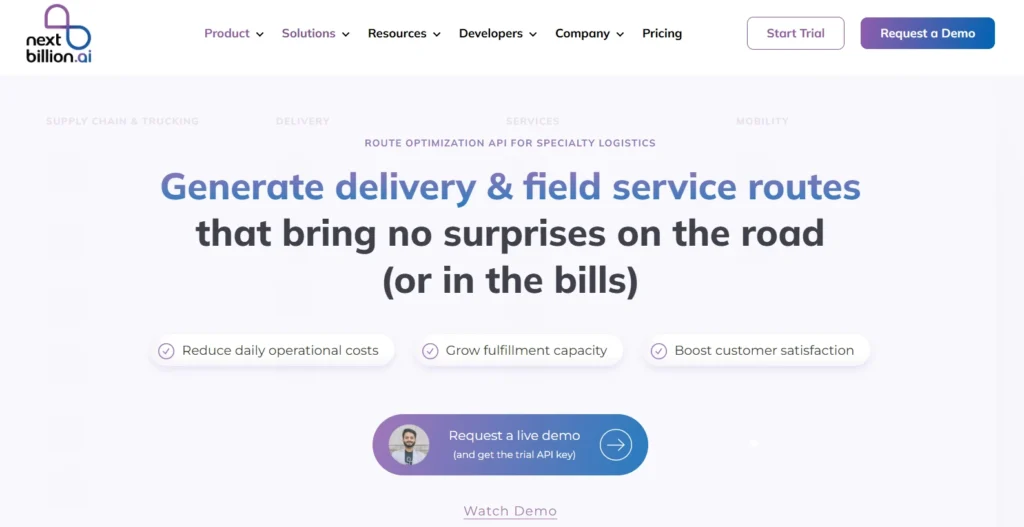

- BLOG
Route Optimization for Plumbing business: A Game Changer
Published: August 7, 2025
Route Optimization API
Optimize routing, task allocation and dispatch
Distance Matrix API
Calculate accurate ETAs, distances and directions
Directions API
Compute routes between two locations
Driver Assignment API
Assign the best driver for every order
Routing & Dispatch App
Plan optimized routes with 50+ Constraints
Trucking
Get regulation-compliant truck routes
Fleet Management
Solve fleet tracking, routing and navigation
Middle Mile Delivery
Optimized supply chain routes
Construction
Routes for Construction Material Delivery
Oil & Gas
Safe & Compliant Routing
Food & Beverage
Plan deliveries of refrigerated goods with regular shipments
Product Demos
See NextBillion.ai APIs & SDKs in Action
Case Studies
Discover what customers are building in real time with NextBillion.ai
Guides
Get in-depth and detailed insights
Product Updates
Latest product releases and enhancements
Blog
Navigate the spatial world with engaging and informative content
Table of Contents

The real job for plumbing service firms begins long before a technician even knocks on the customer’s door, it doesn’t just happen behind bathroom walls or under kitchen sinks. Teams struggle every day to complete as many tasks into the day as they can while juggling strict timetables, emergency calls, traffic jams, and high customer expectations.
Nevertheless, many plumbing business continue to use antiquated scheduling and routing techniques that waste time, fuel, and energy in spite of all the moving components. Routing is more than simply a line on a map; it’s the foundation of a successful service operation, as evidenced by missed appointments, irate clients, and overworked personnel.
The main routing issues that plumbing firms deal with will be dissected in this blog, along with how clever, AI-powered solutions like NextBillion.ai may help transform everyday chaos into predictable, lucrative control.
Plumbing is at the top of the list of necessary services that keep your house functioning properly. Plumbing is a silent but essential part of daily living, from early morning baths to late-night dishwashing. Plumbing companies can aid by providing expert assistance to maintain water flow and manage issues.
A plumbing business specializes in offering water supply system services. Water heaters, sinks, faucets, toilets, and drainage and water supply are all included in the service. identifying leaks, repairing pipes, and dealing with clogged drains or unexpectedly broken pipes.
Plumbers make sure that everyone who depends on plumbing services is comfortable, clean, and safe. Plumbers are required for all tasks, whether building a new home or remodeling an existing one.
Ever pondered what a plumber does for a living? It goes beyond simply repairing dripping faucets. To keep our pipes in excellent condition and our water running smoothly, plumbers handle a variety of jobs. They do a variety of tasks, from setting up new systems to racing to the aid in emergency situations.
Let’s examine some of the main tasks that a plumber performs on a daily basis.
1. Plumbing system installation, upkeep, and repair
The experts on pipelines and drains are plumbers. They are responsible for ensuring that water flows in the proper direction and does not end up in the wrong place.
This crucial position entails installing new plumbing systems in newly constructed buildings, repairing leaky or blocked pipes that are old or faulty, regularly checking pipes to identify issues before they get problematic, and changing out worn-out components to maintain smooth operation Plumbers can be thought of as circulatory system physicians for the house. They carry out examinations, detect problems, and maintain optimal operation.
2. Fitting Appliances and Fixtures
For anything involving water in a house or structure, plumbers are the go-to professionals. They deal with installing new bathtubs, sinks, and toilets, connecting dishwashers and washing machines, installing water heaters to maintain a warm shower, and installing garbage disposals to simplify cleanup in the kitchen.
All of these appliances and fixtures are linked correctly and function flawlessly thanks to plumbers. They are the reason you can flush a toilet or turn on the faucet and obtain clean water without thinking twice.
3. Gas Line Installation and Maintenance
Gas line work is another area in which many plumbers receive training. This important and potentially hazardous job entails gas pipe installation for outdoor grills, fireplaces, and stoves, gas leak detection to protect residences and commercial buildings.
This also includes fixing or swapping out damaged gas lines and installing gas-powered appliances, such as dryers and water heaters.
Gas handling calls for specialized knowledge and extreme caution. These plumbers are essential to maintaining the warmth of our houses and buildings and the safe operation of our appliances.
4. Offering Emergency Assistance
Plumbers are the first responders in times of crisis. Many provide 24-hour assistance for plumbing crises such as homes and businesses are flooded by burst pipes, drains that are extremely clogged and immobile, water heaters that are broken, and backups in unhygienic sewer lines.
The variety and significance of a plumber’s work are demonstrated by these four primary responsibilities. One pipe at a time, plumbers maintain the seamless operation of our contemporary world through both routine maintenance and emergency rescues.
Fixing leaks is only one aspect of plumbing; other aspects include effectiveness, dependability, and time management. However, inefficient routing is a significant obstacle that plumbing enterprises frequently encounter as they expand.
Let’s examine the main routing issues that plumbing companies deal with and why resolving them is essential to expanding operations.
In the plumbing business, every second matters. Whether it’s a planned maintenance task or an emergency water leak, timing is crucial for technician productivity, customer pleasure, and overall business profitability.
Because of this, routing the process of organizing and planning the routes your plumbers take to get to job sites is a strategic priority rather than merely a back-office chore.
1. Enhances Reaction Time
How quickly a plumber can get to a job site depends heavily on routing. Technicians can cut down on travel time by using the quickest or shortest route possible with smart route planning. This is particularly crucial in plumbing emergencies where delays might result in serious property damage and irate customers.
2. Lowers Vehicle and Fuel Expenses
Plumbing businesses that service wide areas may easily overspend on transportation due to the growing cost of fuel. Optimized routing saves fuel use, cuts down on needless miles, and lessens wear and strain on vehicles. This prolongs the life of your fleet while also saving money.
3. Makes More Jobs Possible Every Day
A minute earned for service is equal to every minute saved while traveling. Plumbers may finish more jobs in a single day without feeling rushed or overworked because to efficient routing. This increases income without raising operating or personnel expenses.
4. Distributes Technicians’ Workload Equilibrium
A fair and balanced job distribution based on geography, technician availability, and skill is ensured by proper routing. Intelligent routing can divide work evenly, boosting team morale and lowering burnout, rather than overburdening a select few plumbers while leaving others unused.
5. Increases Client Contentment
Rescheduled appointments, late arrivals, or no-shows can seriously harm your reputation. Customers are more likely to write favorable reviews, rebook future services, and recommend your company to others when you provide accurate ETAs and prompt service.
6. Facilitates the Management of Emergency Calls
Plumbing companies frequently get urgent calls that need to be attended to right away. By locating and sending the closest available specialist without interfering with the day’s plan, efficient routing enables businesses to handle emergency jobs.
7. Lessens Overload in Administration
Dispatchers could have to spend hours resolving issues, modifying schedules, or handling missing appointments if they don’t have optimum routing. The operations team can concentrate on customer interactions and service quality by automating the routing process, which also lessens the manual workload.
If they’re caught in traffic, sent to the wrong place, or have an unattainable schedule, even the best plumbers can’t perform their jobs well. The efficiency of the day is directly impacted by the routing of service calls, which affects both the technicians and the clients.
Nevertheless, a lot of plumbing service providers have trouble with antiquated or ineffective routing systems that cause more issues than they fix.
Many businesses still schedule jobs using spreadsheets, pen and paper, or simple calendar apps. The intricacy of field service routing is beyond the capabilities of certain systems, including traffic circumstances, variations in job duration, technician availability and expertise, and last-minute cancellations or modifications.
Plumbers are forced to travel across cities rather than taking a logical path due to manual scheduling, which results in overlapping work, time gaps, and inefficient sequences. Time, fuel, and technical energy are all wasted in this way.
Unpredictable, urgent calls—such as busted pipes, flooded bathrooms, or broken water heaters—are common in the plumbing industry. Dispatchers are left to fumble in the absence of a technology that can dynamically reroute technicians in real-time.
This leads to disruption of previously established timetables, postponements of other appointments, overworked technicians, and service-level agreements (SLAs) that have been missed.
In an emergency, customers want prompt service; if you don’t provide it, you risk losing their business forever.
Schedule disruptions can be caused by weather, construction, traffic jams, and road closures. However, a lot of routing systems overlook real-time or forecast traffic data.
Consequences include:
On the road, even the best-laid plans can go awry without real-time route updates.
Repeatedly sending technicians around town without taking location clusters into account is a surefire way to become inefficient. Plumbers spend more time driving than resolving problems if their jobs aren’t grouped geographically. Fuel prices rise as a result. Travel tiredness reduces daily capacity. All of this indirectly reduces the amount of clients the plumbers serve.
For businesses that serve huge urban or suburban areas without zoned planning or route optimization technologies, this is particularly troublesome.
The qualifications and skill sets of plumbers differ. When a junior technician is assigned to a complicated task, such as installing a tankless water heater, the job may be delayed or rescheduled. In addition to causing frustration, mismatch jobs squander the plumber’s journey to the destination.
The operational expenses will go up if the test is scheduled with a different plumber. The result of this problem will be unhappy customers.
Businesses run the danger of inefficient work allocation if they don’t have a routing system that takes technician expertise and job type into account.
Dispatchers work in the dark without GPS tracking or real-time status reports. They are unaware of the technician’s current location, whether the job is taking longer than expected, when the technician will arrive at the next client, and whether the technician is capable of handling an emergency detour.
This lack of visibility results in misunderstandings, guessing, and lost chances for upselling or job reorganization.
Not everything goes according to plan. Equipment malfunctions, jobs take longer than anticipated, or customers cancel or are not home. There will be holes in your schedule that could have been filled if the system is unable to adjust on the go.
The technicians’ time was essentially wasted. The entire workflow will be interrupted, which will lower daily productivity.
Today’s customers demand precise arrival windows, real-time updates, and live technician tracking. But with outdated routing systems, ETAs are often just rough guesses.
This leads to Customers waiting longer than promised, higher rates of no-shows and cancellations, negative reviews or loss of trust, increased calls to customer support
Plumbing firms may inadvertently book two tasks at the same time, schedule work too tightly without any buffer time, or neglect to provide technicians with breaks or downtime if they do not have an intelligent scheduling system that takes into account travel time, job duration, and technician availability.
This puts too much strain on your team and leads to delays or job rescheduling, which negatively impacts both employee morale and the client experience.
Plumbing service providers might start identifying opportunities for improvement by comprehending these routing problems. The first step to efficiency is identifying the shortcomings of current systems, which might range from improved technology to more intelligent scheduling techniques.

In a fast-paced, uncertain climate, plumbing service firms handle more than simply pipes and repairs; they also oversee fleets of specialists, handle emergency calls, and work to maintain client satisfaction. One crucial issue at the center of it all is routing. Ineffective routes have a domino effect, resulting in lost appointments, delays, disgruntled clients, and irate employees.
NextBillion.ai provides a customized, clever solution in this situation. It assists plumbing businesses in revolutionizing the way they organize, carry out, and oversee their everyday operations using its powerful mapping and routing platform.
NextBillion.ai creates intelligent, context-aware routes based on actual circumstances rather than merely offering a route from one address to another. To create time- and fuel-efficient routes, it considers traffic patterns, task duration, technician skill level, and job location.
This software allows businesses to better utilize technician time by adapting routes to real on-ground needs, unlike manual scheduling tools or simple map apps. This results in more appointments being met each day, fewer needless miles driven, and less downtime in between work.
Plumbing services deal with emergencies on a regular basis; blocked drains, broken heaters, and unexpected leaks don’t wait for convenient scheduling. Upon receiving such calls, dispatchers can quickly determine the most appropriate and nearby technician thanks to NextBillion.ai.
It dynamically modifies the rest of the day’s agenda to ensure that the urgent task is completed promptly without interfering with scheduled appointments. Even when the day takes unexpected turns, this degree of reactivity enables firms to remain adaptable, trustworthy, and customer-focused.
Not every professional has the same set of skills, and not all plumbing jobs are created equal. Rescheduling, follow-up visits, and time waste are frequently the results of assigning the incorrect individual to a specific task. Businesses can delegate tasks using NextBillion.ai according to the qualifications, experience, and skills of each technician.
The system recognizes which tasks, such as installing water heaters or repairing gas lines, call for more specialized knowledge and matches them appropriately. In addition to increasing technician confidence and client happiness, this guarantees greater success rates on the initial visit.
Even the most well-planned day can become a nightmare due to urban congestion, road construction, and peak-hour traffic. NextBillion.ai creates routes that take into consideration the state of the roads by using both historical and real-time traffic data. The device automatically seeks a different route in the event of an unexpected jam or obstruction, keeping the technician on course.
By preventing delays, reducing idle driving time, and supporting dependable ETAs, this proactive rerouting can greatly enhance customer satisfaction and brand reputation.
Most businesses lose sight once technicians are on the road, which makes it challenging to manage cancellations, delays, or reroutes. By providing real-time GPS tracking of each technician’s location and status, NextBillion.ai alters that. With complete visibility into field activities, dispatchers can reliably handle jobs.
They can make judgments based on real-time field data rather than conjecture, move jobs when necessary, and notify clients of precise arrival schedules.
The majority of plumbing companies currently rely on CRMs, job management platforms, or legacy systems, as NextBillion.ai is aware. It provides adaptable APIs that easily interact with current workflows rather than requiring businesses to start from scratch.
Whether it’s updating job status, setting up appointments, or syncing client data, the platform unifies all of these processes into a seamless, unified system. This facilitates uptake and yields results right away.
NextBillion.ai can grow to accommodate your demands, whether you’re managing a fleet spread across several cities or a staff of five technicians. It expands with your company, providing steady performance whether you’re managing 20 or 200 jobs a day.
Additionally, the platform’s cost-effective architecture reduces administrative workload while enhancing technician output, minimizing gasoline expenses, and improving client retention, all of which yield quantifiable returns.
Every mile, minute, and error in the plumbing industry can result in missed chances, additional expenses, and lost time. Routing need not be a daily hassle, though, if the proper technology is in place. Complex, erratic schedules are transformed into intelligent, effective plans by NextBillion.ai, which adjusts in real time to keep your technicians on the go, your clients satisfied, and your company expanding.
NextBillion.ai is more than simply a map for service providers prepared to abandon cumbersome manual planning and expensive detours; it’s your competitive edge on every street, every call, and every day.
Divya is a dedicated Technical Content Writer with experience of two years in the industry. Her expertise spans various forms of writing, including blogs and website content.